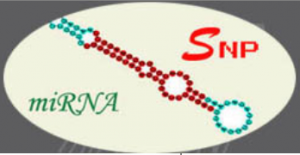Status:
Platform:
Implement Technique:
Species:
MicroRNAs (miRNAs) are studied as key regulators of gene expression involved in different diseases. Several single nucleotide polymorphisms (SNPs) in miRNA genes or target sites (miRNA-related SNPs) have been proved to be associated with human diseases by affecting the miRNA-mediated regulatory function. To systematically analyze miRNA-related SNPs and their effects, we performed a genome-wide scan for SNPs in human pre-miRNAs, miRNA flanking regions, target sites, and designed a pipeline to predict the effects of them on miRNA-target interaction. As a result, we identified 48 SNPs in human miRNA seed regions and thousands of SNPs in 3' untranslated regions with the potential to either disturb or create miRNA-target interactions. Furthermore, we experimentally confirmed seven loss-of-function SNPs and one gain-of-function SNP by luciferase assay. This is the first case of experimental validation of an SNP in an miRNA creating a novel miRNA target binding. All useful data were complied into miRNASNP, a user-friendly free online database (http://www.bioguo.org/miRNASNP/). These data will be a useful resource for studying miRNA function, identifying disease-associated miRNAs, and further personalized medicine.[1]
MicroRNAs (miRNAs) are key regulators of gene expression involved in a broad range of biological processes. MiRNASNP aims to provide single nucleotide polymorphisms (SNPs) in miRNAs and genes that may impact miRNA biogenesis and/or miRNA target binding. Advanced miRNA research provided abundant data about miRNA expression, validated targets and related phenotypic variants. In miRNASNP v2.0, we have updated our previous database with several new data and features, including: (i) expression level and expression correlation of miRNAs and target genes in different tissues, (ii) linking SNPs to the results of genome-wide association studies, (iii) integrating experimentally validated miRNA:mRNA interactions, (iv) adding multiple filters to prioritize functional SNPs. In addition, as a supplement of the database, we have set up three flexible online tools to analyse the influence of novel variants on miRNA:mRNA binding. A new nice web interface was designed for miRNASNP v2.0 allowing users to browse, search and download. We aim to maintain the miRNASNP as a solid resource for function, genetics and disease studies of miRNA-related SNPs. Database URL: http://bioinfo.life.hust.edu.cn/miRNASNP2/[2]
References
- Genome-wide identification of SNPs in microRNA genes and the SNP effects on microRNA target binding and biogenesis.,
, Hum Mutat, 2012 Jan, Volume 33, Issue 1, p.254-63, (2012)
- An update of miRNASNP database for better SNP selection by GWAS data, miRNA expression and online tools.,
, Database (Oxford), 2015, Volume 2015, p.bav029, (2015)








